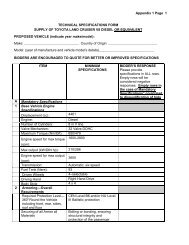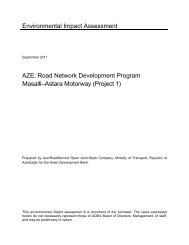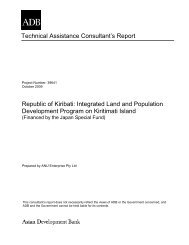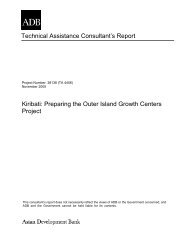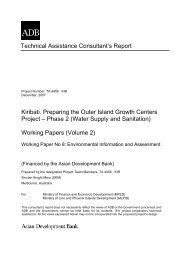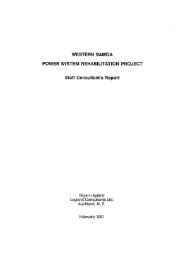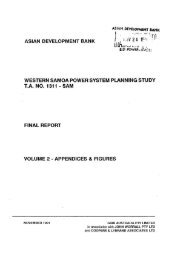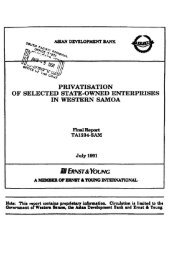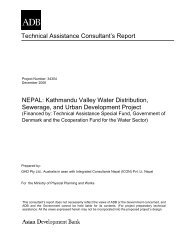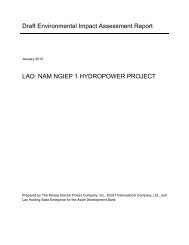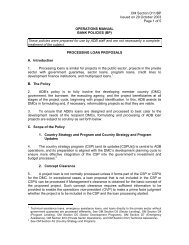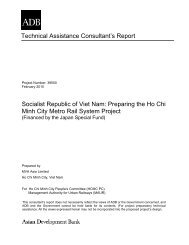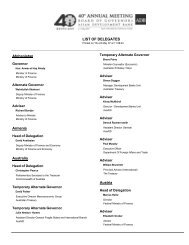Kshipra Sub Basin - Asian Development Bank
Kshipra Sub Basin - Asian Development Bank
Kshipra Sub Basin - Asian Development Bank
Create successful ePaper yourself
Turn your PDF publications into a flip-book with our unique Google optimized e-Paper software.
Support to the National Water Mission NAPCC<br />
Appendix 3 <strong>Kshipra</strong> <strong>Sub</strong> <strong>Basin</strong><br />
A. Introduction<br />
IV. WATER SECTOR COMMUNITIES AND STAKEHOLDERS<br />
55. Inclusive growth paradigm has made it almost mandatory to have stakeholders‘ participation in<br />
the design, implementation of public policy and decisions about the delivery of services (Martin, 2005)<br />
and also as peer monitoring group. Stakeholders are those who have an interest in a particular<br />
decision, either as individuals or representatives of a group. People who influence or can influence a<br />
decision as well as those affected by it can be considered as stakeholders. Community of<br />
stakeholders can become active with some specific goal. Without going into the definitional debate on<br />
‗community‘ across disciplines we can use it here to describe a group who shares identity on some<br />
specific respect and shares (any one or all) belief, resources, concerns, needs etc. The size of a<br />
community can vary.<br />
56. A commonly shared vision by all stakeholders to have a successful intervention be it policy,<br />
technology or systemic. For the current assignment, specific goal around which we are trying to<br />
identify a community is ―to examine intervention requirements, scope and strategies to improve the<br />
efficiency of water systems and how improved efficiency may be applied to climate change<br />
adaptation‖.<br />
57. To identify water sector stakeholders from climate change point of view within the scope of this<br />
assignment we consider the community associated with the issue at hand. It covers part of the human<br />
society whose employment/livelihood/income/productivity stream will be directly impacted in future -<br />
become riskier/decline- with change in stock and/or flow of water. The stakeholders who are active<br />
with this goal are both national and state government across various departments, knowledge<br />
generators engaged in technological and social innovation, farmers, NGOs. In the context of this<br />
study stakeholders/community are broadly: water source owners, water flow service providers and<br />
water stock and flow users.<br />
58. Water source ownership in the state is represented by multiple categories of stakeholders not<br />
fully coordinated and rules on human interventions on the natural water system if not governed by fully<br />
defined rules.<br />
o Primary sources of water flow are natural 6 (rainfall) defining the overall constraint on primary<br />
water supply. In climate change context adaptation challenge is if the community has<br />
knowledge and preparedness to take actions now so that the individuals, households and<br />
community becomes resilient to uncertain water supply condition in future without affecting<br />
wellbeing (in micro sense we consider current and future income stream of farmers and in<br />
macro sense productivity in agriculture to make state domestic product resilient).<br />
o Secondary sources are various institutional sources based on surface water flow: Interstate<br />
high level body (e.g ., Gandhisagar dam) in control of surface water flow with 10% share for<br />
MP, WRD department owned canal system, Agriculture department owned micro and medium<br />
irrigation systems and famers withdrawing water from open access ground water aquifers with<br />
variety of pumping technology and farm pond based water harvesting systems.<br />
59. Stakeholder can be categorised into water providers and water users as shown in Figure 33.<br />
6 nature do not play an active role as stakeholder for our decision making purpose<br />
36



